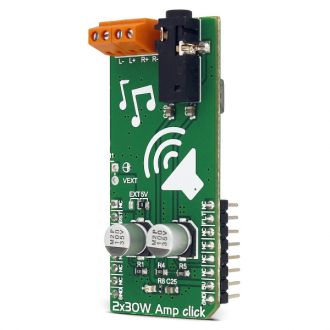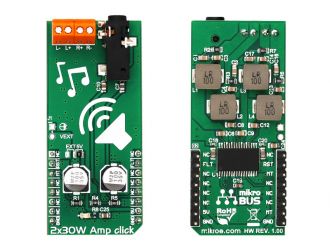
We strongly encourage users to use Package manager for sharing their code on Libstock website, because it boosts your efficiency and leaves the end user with no room for error. [more info]

Rating:
Author: MIKROE
Last Updated: 2018-06-18
Package Version: 1.0.0.0
mikroSDK Library: 1.0.0.0
Category: Amplifier
Downloaded: 4972 times
Not followed.
License: MIT license
2x30W Amp click is a class-D audio amplifier with a tremendous output power, considering its size and lack of huge heatsinks, usually associated with the audio amplifiers.
Do you want to subscribe in order to receive notifications regarding "2x30W Amp click" changes.
Do you want to unsubscribe in order to stop receiving notifications regarding "2x30W Amp click" changes.
Do you want to report abuse regarding "2x30W Amp click".


Library Description
The library allows the device to be enabled or disabled and allows the mute and the unmute operation. The library also has the ability to check fault condition (over current, over temperature and too high DC offset condition).
For more details check the documentation.
Key functions:
Examples Description
The demo application is composed of three sections:
void applicationTask()
{
c2x30wamp_mute( _C2X30WAMP_MUTE );
Delay_ms( 4000 );
c2x30wamp_mute( _C2X30WAMP_UNMUTE );
Delay_ms( 10000 );
faultCheck = c2x30wamp_checkDiagnostic();
if (faultCheck == 0)
{
mikrobus_logWrite( "Fault condition!", _LOG_LINE );
}
}
mikroE Libraries used in the example:
Additional notes and information
Depending on the development board you are using, you may need USB UART click, USB UART 2 click or RS232 click to connect to your PC, for development systems with no UART to USB interface available on the board. The terminal available in all MikroElektronika compilers, or any other terminal application of your choice, can be used to read the message.